Testimonies
Draw Me, Mariama
"Sometimes it seems that noma attacks the most beautiful children, the children with the finest faces." With these words, Mariama, a Sentienlles nurse, puts the unthikable into words.
It's October 2020, and a little girl suffering from the disease has just arrived at Sentinelles Noma Centre in Niger.
This little girl is also called Mariama, like our nurse. She is 5 years old. She is small and extremely thin. The moderate malnutrition from which she suffers is partly responsible for this wiry appearance, but it's also a quesiton of morphology. Mariama is a Nigerian girl like so many others, except that she arrives at the Sentinelles nurses with a large amount of necrosis on her face, which will fall off in the following days, as will her eye. This left a gaping hole in her left cheek. Her little nose is also affected, and only half of it will remain.
Fortunately not all children arrive at our Centre in Zinder with the same symptoms, but for some of them, the disease is taking its toll. Not all children with the ater-effects of noma have the same reation to the disease. Often, once the have recovered from the acute phase, toddlers regain their zest for liffe because they are unaware of their face and their difference. But Mariama is one of the children most affected by noma, both physically and psychologically. It's hard to get a smile out of her, and she remains sad and lethargic almost all the time during her various stays at the Centre. We don't really know what she's feeling, and our team witnesses heartbreaking moments when she keeps her hand over her face in an attempt to hide her after-effects.
When she is at the Centree, we see her take part in the activities on offer and discover that Mariama has a fantastic talent for drawing ! Armed with chalk or coloured pencils, she quickly takes to the game of illustration, and her presence at the Centre's little school every morning allows us to see her blossom. Sometimes, when she's playing, she even laughs out loud, and it's such a relief to hear her spontaneous little cries. It makes you realise that part of her is still a child, with no worries or lingering unhappiness.
For 2 years, Mariama will be monitored by our Nigerian team to see how the healing of her lesion is progressing and to prepare her for her transfer to Switzerland. In August 2022, once all the administrative and logistical hurdles had been cleared, she arrived at Geneva airport. Everything followed on from there. Mariama first went to the Terre des Hommes Valais home in Massongex, where she met many children from all over the world, especially Fadilla, another little Nigerian girl who had arrived a few months before her.
Consultations were held at Geneva University Hospitals, where Mariama was seen by a team of specialist doctors who defined the procedure they would follow to reshape the left side of her face.
The consultations follow each other as do the facial reconstruction operations, four in all. Mariama always looks a little sulky, she probably has a strong character, but doesn't it take that to get through all these ordeals ? In the consultation room at the hospital and at La Maison, Mariama draws as much as she can and the smile is increasingly present on her face... especially when she plays in the snow that falls in Massongex during her stay.
Mariama will be returning to Niger in June 2023, bright eyed and with a suitcase full of crayons. She will return to Switzerland in a few year's time for the reconstructionof her nose, which can only be redone when she has grown up. Before returning to her family, she went to our Centre in Zinder, where our nurse, the other Mariama, welcomed here like all the children who get a new face : with a smile on her face and a great joy at being a link in the chain that enables these children to benefit from excellent care, between Niger and Switzerland.
In Sentinelles Newspaper, December 2023
Louka
Louka, 11 years old, is returning to Burkina Faso after seven-month stay in Switzerland. He was transferred to us for an operation to remove a constriction in his jaw (almost total inability to open his mouth), following sequelae of noma, a disease he contracted at the age of three. Unfortunately, given the complexity of the condition, this operation is impossible in his country.
He courageously underwent two successful operations at Geneva University Hospitals (HUG), involving a maxillo-facial surgeon and a plastic surgeon. Volunteer visitors visit him regularly during his hospitalisations to make his liffe in hospital a little easier.
During his stay, Louka lives at the Maison de Terre des Hommes in Massongex, Valais where he is very well looked after and cared for. He shares his life with many others children from different countries, with whom he has a lot of fun, playing board games, animating and playing football, which he particularly enjoys. The young boy also takes part in school classes to consolidate his knowledge, make progress in various areas and be able to return to school without difficulty on his return home. A polite and helpful child, it's clear that he loves to learn.
When he first arrived, Louka was rather shy and reserved, but he adapted well to our country and to his life at the Maison d'acceuil and gradually grew in confidence to become a cheerful, very sociable and communicative boy. It's a great pleasure to accompany him every week to his consultations at the HUG. At the same time, Louka has to undergo physiotherapy treatment, for which he has to be assiduous, as he absolutely must not let his mouth close up. He is very cooperative and courageous, and his efforts are bearing fruits.
Back home, Louka, of the Bobofing ethnic group and animist religion, will be reunited with his family. Born into a polygamous family - his father has two wives - he will be happy to see his parents, his four brothers and sisters and this half-brother. Louka will be returning to school at the start of the new school year, while continuing with the regular physiotherapy sessions necessary to ensure that he does not lose the benefits of fall this efforts. We wish him a safe journey home and all the best for the rest of this life.
text@ www.sentinelles.org
Marieta
Marieta is certainly a survivor. Thanks above all to her live force, but also to an incredible chain of solidarity that includes a doctor at the Zorgho medical centre. In July 2017, he contacted us to refer a five-year-old girl suffering from acute noma to our Sentinelles centre in Ouagadougou. So far, the procedure has been normal. Health workers and doctors regularly bring us children suffering from this disease, and our centre is recognised for its expertise in treating cases of noma. But the rest of the story is more shocking and tragic than anyone can imagine.
How can we explain the story of little Marieta ? It is hard to imagine such a situation of abandonment.
Marieta's father was opposed to her receiving medical care and being transferred to Ouagadougou for urgent treatment. We contacted the social services and various mediators who spoke to the father, to no avail. A delegation from our team then travelled to Zorgho to convince him to entrust his daughter to us. Marieta, whose mother was orphaned, lives with her father, who has several other wives and children living in the same family yard. In the course of our discussion, we came to understand that not only had her father neglected to take her to health centre, but he was also letting her die.
It was the supervisor at the neighbouring school, concerned that Marieta had been absent for some time although she had to come to play in the school playground everyday, who discovered Marieta abandonned in a cornerfo the family playground. Her father had left her to die without food or water. Worse still, he told us he had already prepared a shroud and shovels to bury her in. Finally, he agreed to entrust Marieta to us. Nemata her 12-year-old half-sister, accompanied us to the centre to look after her. Later, we learn that Marieta has been HIV-positive since birth, but tat she has never received antiretroviral treatment, even though it is free at Burkina Faso. In the weeks that followed, Marieta quickly regained her strength thanks to treatment and a good diet. What remains is the psychological impact of such abandonment and mistreatment. Seeing her now laughing and playing in the Sentinelles playgound like so many other carefree children, we are extremely happy to see that Marieta has this incredible capacity for resilience and that she was able to benefit from the intervention of guardian angels ant the right time, who enabled us to save her.
In April, 2018, Marieta was able to return to her maternal family, who welcomed her with love. She now lives with her older sister Nemata in her grandmother's hut, well looked after by here uncles. Hervé et Marie-Lou, two students form ECAL who are making a documentary on noma for Sentinelles, accompanied our team on the ground for this réunion. Their comprehensive film looks at the issues surrounding noma and traces much of its history. Marieta as noma survivor has thus become the heroine of a doocumentary that can help raise awareness and prevent situations that could affect other children in Burkina Faso, Niger or elsewhere.
Marie-Jeanne
Marie-Jeanne, an 8-year-old girl from Burkina Faso, arrived in Switzerland as part of a humanitarian transfer. The little girl suffers from serious after-effects of noma, contracted when she was three years old, requiring complex surgical treatment that is unfortunately not possible in her country. She has survived thsi terrible disease and is described as a "miracle worker".
In Burkina Faso, Marie-Jeanne comes from the Mossi ethnic group and speaks Mooré. She lives in a traditional village of Pissié, in a round mud hut with a thatched roof. The third of four children, she is much loved by her parents and her maternal grandmother, who shares her home. After a period of rejection because her face was destroyed by noma, she is now well integrated in her community.
The little girl is not yet at school, but loves embroidery, which she learned from her mother, who received our support to develop this activity.
Marie-Jeanne arrived in Switzerland eleven months ago. Having lost her bearings, she quickly showed great resilience and adapted wonderfully to her new life. Between hospital stays, she was taken in at the Terre des Hommes centre in Massongex, where she took part in community life and attended school. She soon showed great interest in school work and made enormous progress. She enjoyed learning to read, write, count and draw. Marie-Jeanne has shown that she has a great deal of ability, even though she has not started yet going to school.
Marie-Jeanne was treated at Geneva University Hospitals (HUG) and underwent three operations to reconstruct her mandible by removing bone from her fibula.
Her second stay in hospital was prolonged because the little girl dit not heal easily. Fortunately, she rerceives visits from our dedicated volunteers, who look after her and take her mind off things. She does arts and crafts, plays games, goes to the garden wheneverrr possible, and we read her stories. We regularly accompany her to check-ups. Treatment is not always well tolerated, and our presence helps her to cope with the fear of medical procedures. During these consultations, when we do activities with her, we can see her progrress in terms of learning and her potential.
There is one last little operation left, after which Marie-Jeanne will be able to return home to her loved ones. We wish her courage as she completes this long-term treatment and a safe return home.
text@ www. sentinelles.org.
Fadila
Fadila is a very fril little girl, aged 6 or 7, who recently arrived at the Sentinelles reception centre in Niger with acute noma, which has destroyed the whol of her lower face. A necrotic bone is visible and her palate is also affected. In spite of everything, two big frightened, questioning eyes light up this ravaged face. Once she had been treated and bandaged, Fadila got up and walked quietly back to her dormitory. Big tears roll down her mum's cheeks ; she knows now that if the little girl had been looked after properly straight away, none of this would have happened. But in the villages, there are still so many taboos and beliefs... She was told that Fadila was a victim of "Matabiya", a kind of spell linked to genies. According to this belief, if a child is taken to the dispensary and given an injection, he dies immediately. This is why Fadila's mother followed traditional medicine rather than to go to the health centre. It is easy to imagine the guilt that must weigh heavily on this woman's heart. And it just goes to show how vital awarenesss raising sessions are. A few days later, Moussbahou, the chief nurse was able to remove the completely necrotic lower jaw bone, thus facilitating the healing process.
So much suffering in such a short life, and so much courage in this little girl. Fadila and so many other children have escaped certain death thanks to Winds of Hope's loyal annula support for Sentinnelles's noma program.
text @www.sentinelles.org
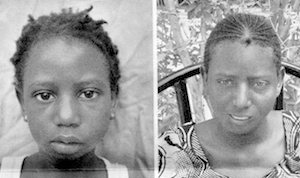
The long haul to recovery
About fifteen years ago, Sentinelles discovered a little 3-year-old girl who could no longer open her mouth. Bassariya had a constriction of the jaws due to noma, to which she had fallen victim aged 18 months. Sentinelles' biggest immediate concern was to monitor her growth, because the total mandibular constriction she was suffering from had prevented her from eating properly, and so she was well behind the normal growth rate. But despite their efforts, and the administration of a daily milk ration as a dietary supplement, Bassariya remained puny.
Operation in Switzerland
Bassariya was transferred to Switzerland 3 years after she had first been treated. The operation was delayed until she had gained weight; her bone age corresponded to that of a 3.5-year-old child, whereas she was 6 years of age. So an accelerated program of intensive nutritionwas implemented. The complexity of Bassariya’s constriction explains the problems she had with relapses in the years that followed. After several operations, she underwent long courses of physiotherapy, first in Switzerland and then in Niger, to maintain the oral aperture that had been achieved. But Bassariya struggled to get motivated for her exercise sessions.
Back home, she relapsed
Her fragile health made her prone to many infections. Because of the cough she developed after a bout of pertussis, her parents decided to suspend the physiotherapy exercises. The opening in her mouth reduced in size until the jaw once again contracted. She could no longer open her mouth. It became necessary to extract two teeth to allow her to eat more easily. Parental neglect played a role in this relapse. The parents of Bassariya had also to look after her 20 brothers and sisters. The father, a polygamist, has difficulty providing for his four wives, and all his children. Her mother appears to have psychiatric disorders. Sentinelles wanted to give Bassariya more surgical treatment but the team was unanimous: since the parents’ follow-up was too weak, she would have to wait until adolescence.
Sewing ambition
Her second transfer to Switzerland took place from October 2012 to February 2013. It took a lot of courage for Bassariya who was depressed when away from her family. The operation went very well, but on her return home she faced the question of her future as a young woman. She had dropped out of school several years previously, but in discussions at Sentinelles’ Center in Zinder she expressed her desire to learn sewing, a skill that would enable her to acquire financial independence. A project for her to receive training with her tailor uncle at Takiéta was organized, but unfortunately the parents did not follow through. They tried to avoid their daughter's health checks and she herself neglected her maintenance physiotherapy. Social workers who saw Bassariya’s mouth opening reduce in size decided to take her back to the Zinder health center. During the following months, she went back and forth between her family home and the Reception Center, 45 km away. Bassariya's lacking sense of responsibility and the neglect of her parents led to the decision in the fall of 2015 to move her into the Center under the supervision of the medical and social teams to ensure a lasting solution for her future.
Finally some training
Because by temperament she was very patient and protective towards the young children residing in the center, Sentinelles decided to engage Bassariya as a nanny. She accompanied the children every month with the Sentinelles team to the surgical missions organized in Niamey. She was delighted with this new responsibility and her income allowed her to enroll in the school of sewing in Zinder in order to obtain a diploma 2 to 3 years later. The autonomy she is gradually gaining will allow her to choose a husband rather than be forced into a marriage by her family to ensure that she is looked after. She is waiting for the start of the academic year to begin her training.
Texts and photos @ Sentinelles
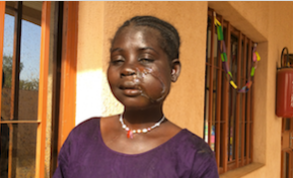
From Slavery to Freedom
Fatoumata does not know her exact age, she does not have a birth certificate and her father and her mother have both died. She was a victim of noma at age five. We judge her to be about 18 years old. She lives hidden away at her uncles’ home and does all the housework. She has a child of about 18 months old. Fatoumata comes from a remote village in northeastern Mali, an area that has suffered greatly and which is still very isolated today because of the presence of jihadists and bandits of all kinds. Fortunately a young doctor crossed her path and sent her to Sevaré with other patients and their accompanying persons. At first she refused because she had no one to accompany her. We insisted, because she could come alone. We knew nothing about the existence of her child, the result of rape. The child was entrusted to members of their clan without Fatoumata’s consent. When she arrived at Sevare, she just disappeared. She had gone in search of her child
Thanks to the physician's relations, we found her and left two days later for Ouagadougou together with the group scheduled to be treated at Prof. Brigitte Pittet’s the surgical mission. Two hours after our arrival at the Sentinelles center we watched live on TV the terrorist attacks on the Splendide hotel and the Cappucino restaurant which left 30 dead and many wounded. Luckily, we were outside the city center. The whole city watched this with terrible anguish. Fear was everywhere. Flights were cancelled. Part of the team was diverted to Abidjan, the others to Lomé. Twenty-four hours later, everyone was able to reach Ouagadougou and decided to stay and carry out the surgical mission.
Work began, and Fatoumata was operated on a few days later. The first days were difficult for her, because she did not understand everything that had happened to her since leaving her village. Nurses carried out the postoperative care and the whole team gave the patients support, reassuring them. Their condition improved rapidly. Fatoumata became socially integrated during her one-month stay at the Sentinelles Center. She played with the children, discussed with mothers and helped with the laundry. She received treatment from physiotherapists and conscientiously learned the exercises she would have to pursue in her home.
When we returned to Mali, Fatoumata joined her relatives in a Bella nomad camp in Mopti. The driver and she had a hard time finding them. Two days later, we go to see her with the doctor from her village. The child had been placed in another village and Fatoumata was expected to work as an indentured maid in Mopti. The kind of "slavery", which unfortunately all too many children in Africa still have to suffer. We just cannot let that happen. We seek and find a solution ensuring she can lead a good life with her child at her side, thanks to the young doctor from her village. A generous and very courageous doctor, because he remained in his village when it was occupied by jihadists, whereas all the state officials had fled. The latest news is that Fatoumata is with her mother’s sister. Both of them intend to go back to their village.
Text and photo @ Elisabeth Simon AVEC MALI
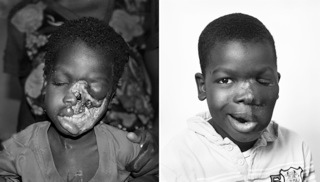
From a savable life...to a life saved
This little 8-year-old boy is one of the latest children with noma to be transferred to Switzerland to benefit from reconstructive surgery. He arrived at the reception center in Zinder then aged 5 with the left half of his face destroyed. The sequelae were irreversible and profound.
Five traditional healers
Early in the disease, Sabiou's extremely poor parents consulted five successive traditional healers, but the disease continued to invade Sabiou’s face. They call this disease "mahalbia", the spirits’ disease, which transforms the child into an evil djinn. Two months later, the parents finally took Sabiou to the local dispensary, and then to Ourafan Health Centre which ultimately referred him to Sentinelles. Sabiou is a brave little boy, and his appetite and strength are promoting the healing of his wound. Little by little, he is integrating into the life of the center.
An unloved first child
His childhood was difficult. Traditionally in his mother’s ethnic group, mothers are supposed to ignore their firstborn. She never mentioned his name, but called him simply "Dan Nana", which means "son of Nana", Nana being the general qualification for any female person.
Sabiou regularly suffered the wrath of his mother who beat him and scolded him at the slightest provocation. Once the emergency treatment vital for his survival was complete, work started with the mother to try slowly to change her behavior patterns. Gradually, she became more affectionate than before, her words kinder, and she started to fetch him his plates of food from the kitchen. She even started consulting the nurses at the slightest sign of weakness in the health of her child. The team encouraged her a lot and is still monitoring her to maintain motivation. Today, she takes good care of Sabiou, both in terms of personal hygiene and making sure he is well dressed. She listens to the recommendations of the Sentinelles team and observes the instructions given about the necessary rules of hygiene.
The abuse suffered by Sabiou forged his character: he stubbornly refused any attempt to treat him, retreating to the dorms and crying most of the time. The months spent at the Center, have made him more open and cooperative.
In Switzerland, Sabiou has had to face up to really radical surgical interventions. He integrated easily with other children at his foster home in Massongex and has enjoyed playing with his new friends.
After eight months living away from his family and his country, Sabiou is now back in Niger with a new smile, ready for a fresh start.
Text and photo © www.sentinelles.org
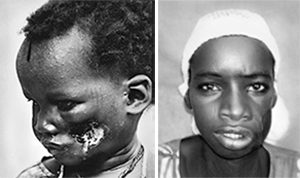
A dream come true
Fifth daughter of a poor family living in a remote village in Niger, Laouré was born in January 1991. At the age of 3, she contracted noma while living with her maternal grandparents near Zinder. The grandmother tried to heal her granddaughter with traditional remedies based on herbal decoction. The remedies having no effect on the swelling edema, Laouré was brought to the rural dispensary where during 7 days she received further, unfortunately ineffective treatment. The health worker decided to refer her to Zinder Hospital. Sentinelles only discovered the child 15 days after her hospitalisation. The disease had unfortunately had enough time to cause irreversible damage to her face : total constriction of her jaws and a substantial loss of tissue on the left cheek. In 1996, Laouré was transfered to Switzerland to undergo a first series of reconstructive surgery in order to replace the damaged tissues of her cheek and enable her to reopen her mouth.
Difficult times at school
Back in Niger with a new face, Laouré started going to her village school. Her shyness, resulting from a combination of her personality and the sequelae from the disease, impeded her schooling. In the years that followed, the difficulties she encountered at school were huge, but she made remarkable efforts too. Laouré was enrolled at a private school in Zinder called Niger Amitié to increase her chances of success. Little by little, her results became brilliant. Unfortunately, however, her marks took a plunge on the successive deaths of her grandparents, which affected her badly. In 2008, she was enrolled at another school in Zinder. As for the medical situation, her hardships were not over: notwithstanding the facial physiotherapy her jaws slowly start constricting again because of an obstructive flap. Moreover, the uncle put in charge of Laouré totally neglected her follow-up care. All these difficulties led to her failing her exams. In 2009, she expressed a wish to work in the field of healthcare. From that moment on, her family and the social team from Sentinelles mobilized to make this possible. But before starting an important phase of her studies, Laouré needed to come to terms with a second transfer to Switzerland for another operation to release her once again constricted jaws.
Realising her dream
This latest operation enabled her once and for all to get rid of the constriction. Laouré came back home with a series of detailed and tailor-made exercices to massage the scar and prevent another constriction. The daily post-operative physiotherapy started showing results. After having successfully passed the admission exams, Laouré finally entered the health school she had been dreaming of in the fall of 2011 and she obtained her diploma during summer 2014. Laouré and her family are visibly proud. Laouré is the first child victim of noma to obtain a professional diploma in Niger. It is a beautiful revenge on a fate to which poor living conditions had initially condemned her.
text and photo @ www.sentinelles.org
A journey towards autonomy
My name is Athanase Ilboudo. I am 35 years old. I sell motorcycle spare parts. I was a victim of noma at the age of 4. My distorted face, exposing my teeth, and the constriction of my jaws made me suffer a lot. I was the laughing stock of the village, everybody rejected me including my own brothers. I never knew the joy of eating in a group, I ate alone. People would avoid me. Losing my parents, one after the other, in less than two years affected me severely since they were my sole source of affection.
Welcomed and supported
In 2003, I end up in Sentinelles’ centre where I am nicely welcomed by the staff. Here I can eat three meals per day while in the past sometimes I did not even get a single meal in a day. I wash myself everyday. I am given new clothes and I feel so relieved to see that I am not the only victim of this terrible disease. In 2007, I am transfered to Switzerland to undergo reconstructive surgery that would enable my mouth to open again. After a stay of 3 months, I have a new face and my mouth finally opens. I fly back to my country and to my surprise, I am warmly welcomed by all those who rejected me in the past. To their eyes, with the operation, I had become somebody important. Sentinelles, to help me prepare for my future, offer to finance a course of training for me in motorcycle mechanics.
Towards autonomy
Because of my learning difficulties I reorient my training towards the field of selling motorcycle spare parts. I often manage my boss’s spare parts shop when he is away so I have a certain know-how in this field. I have become a retailer thanks to Sentinelles who bought me the spare parts that I sell in my boss’s shop. He and I are like partners. I also received a compressor to wash motorcycles. I am now independent, and financially I can fully support myself. Today, when there is a ceremony in the village, I am the first person to be informed; those who ignored me now place me in the forefront. I did not dare to court women, but I now have a wife and she is currently 7 months pregnant. I have bought a small plot of land and I have built a 2 bedroom house in which we live. My wish would be one day to have my own shop.
Text and photo @www.sentinelles.org
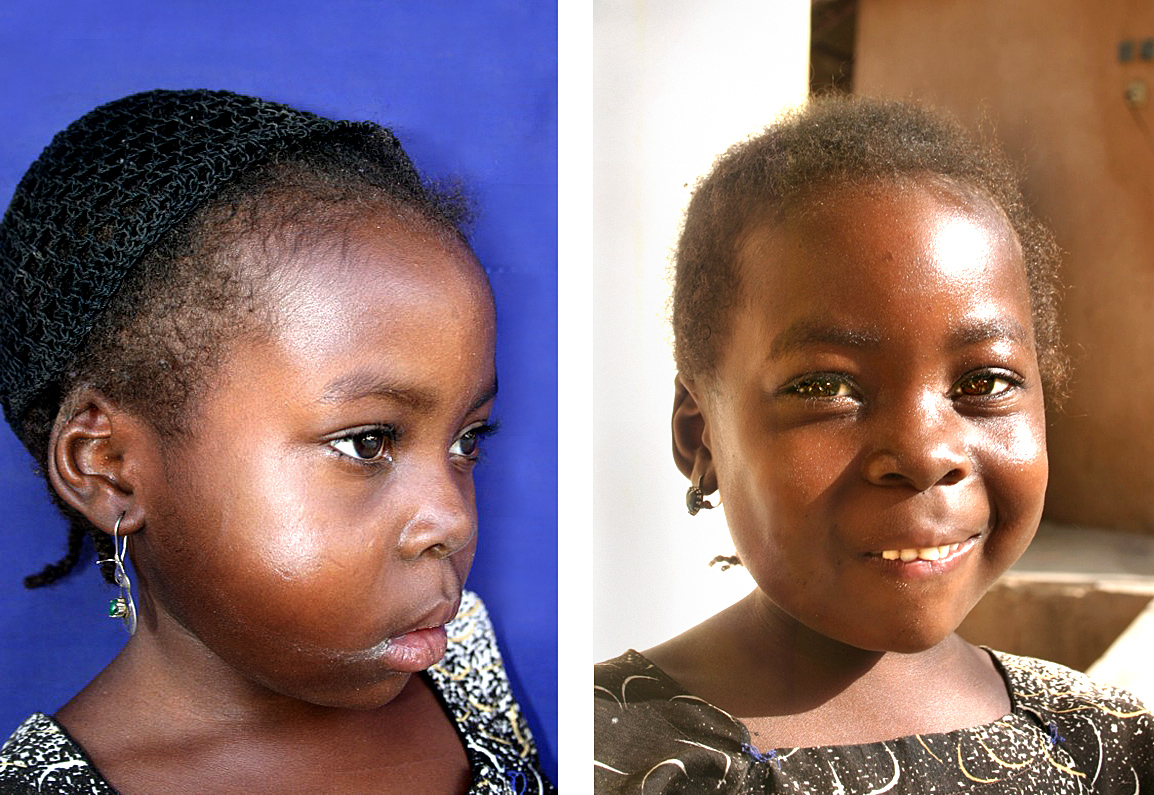
Three days later would have been too late
Awareness-raising efforts are bearing fruit, and the community health workers are getting better and better at identifying the very earliest signs of noma.
"From Niamey last week, a call from the hospital in Dakoro (Maradi region). We immediately organize an evacuation: a team sets off for Dakoro (4 hours each way). At the hospital, in the pediatric ward, we find little Aisha who is suffering from acute noma at the edema stage. Three days later would have been too late ... It's fantastic – awareness-raising efforts are bearing fruit, and the community health workers are getting better and better at identifying the very earliest signs of noma." Manon Chatelain - Sentinelles
Photo 1: Meeting Aïcha – Saved at edema phase without sequelae. Taken at the end of treatment carried out at Sentinelles’ Center in Zinder.
Photo 2: Aïcha at Sentinelles’ Center, Zinder, Niger. She has been treated in time. She will have no permanent effects.
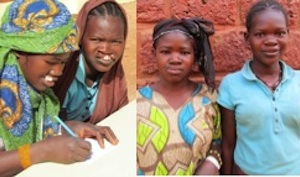
War in Mali
Adama (23 years old) and Assaita (15) originary from a small village in the north of the country Dogon came to work as little maids in Sévaré – Their faces were hidden by a headscarves. Adama was 7 years old when she had noma and Assaita was born with a cleft lip. A driver who was a neighbour of their landlord saw this two girls. Hopefully this minibus driver went often in their district. He decided to convince the parents of the two girls to bring them to Persis’ welcome center in Ouahigouya (North of Burkina Faso) where they could benefit from reconstructive surgery. That was not an easy task since the parents feared their girls would be kidnapped for sexual slavery or organ traffikcking purposes . A neighbour even shouted loudly « don’t let them go, they will sell them and cut their throats ».
The 11th january 2012, the two girls accompanied by their moms arrived in the courtyard of the medical center of Dr. Lassara Zala who is supported by Persis in Valais and Winds of Hope. They all felt reassured when they met the other families also waiting for treatments.
Three days later Adama and Assaita were successfully operated by a french and burkinabe surgical team. Nurses and clinical facilitators working for « Ensemble Pour Eux » (an organization also supported by Winds of Hope ) flew from Switzerland to take care of the girls during the recovery period following the operation.
A month later, Adama and Assaita went back to their villages wearing their beautiful smiles.
testimony from Elisabeth Simon from the organization « AVEC ».







